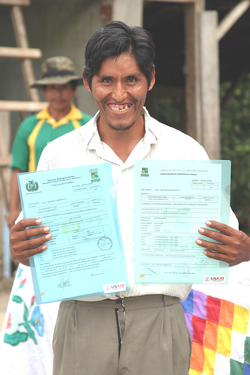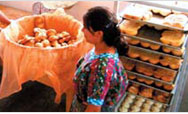You are here » Home » Telling Our Story
Success Story
Farmers receive land titles as part of coca eradication effort
Land Titles Secure a Hopeful Future

| |
Photo: USAID/Walter Mur
|
|
Julio Jankoña, a Bolivian farmer in the Chapare region of Bolivia, proudly shows his legal land titles.
With the support of USAID, Bolivian farmers are switching from coca production to licit crops.
|
Julio Jankoña, a rural Bolivian farmer living in the heart of a major coca-growing region, has a good reason to smile: the government has given him a title that grants him legal ownership of the land that Julio and his family have been working since he was a child.
“We waited 20 years to see this come true. Now we own our land,” said Julio, while proudly showing the title to his family’s 18 acres of land. By the end of 2006, some 17,000 people in the Chapare region will also be proud land title holders for the first time in their lives. This is a modest but important step in a country where access to land is one of the most critical political issues and principal causes of inequality.
With USAID support, the Bolivian government is carrying out an ambitious land titling and property rights regulation plan to address poverty and inequity. The program has already made important contributions, such as reducing the processing time for land titling from two and a half years to less than four months.
In the coca-growing region of Chapare, the land titling initiative is part of a broader program that contributes to Bolivia’s counter-narcotics efforts. Complementing the efforts of private investment and local communities, USAID is helping Bolivia to transform the coca-production zone into an area where licit economic growth and social development can begin to take root. Access to health care, justice, and greater participation in local governments are also important parts of this approach.
Legal crops in Chapare have grown 33 percent in the past four years to more than 350,000 acres. Banana exports, one of the most successful local products, are at 2.3 million boxes per year, almost eight times more than in 2000. Also, the region’s natural beauty and well-developed rural road networks bode well for the future development of the local tourism industry.
People like Julio Jankoña, a proud first-time land owner, have good reason to be hopeful about their futures. The land is already theirs.
Print-friendly version of this page (423kb - PDF)
Click here for high-res photo
Back to Top ^ | 

